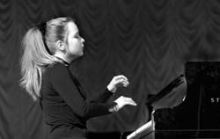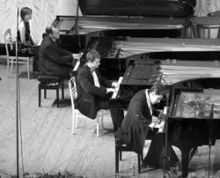In 1995, when the organizers of the foundation (music specialist and current president Yuri Zilberman and the late composer Ivan Karabyts) had just begun their work, they dreamed of discovering talented young pianists and helping their careers. But they never expected that they would be able to do this on such a scale. Ten years have elapsed, and the Horowitz graduates have become known by music lovers in a great many countries. Vladimir Horowitz has been restored to Kyiv as a legendary citizen. For many years his name was taboo because he never accepted the communist regime and preferred to live the rest of his life in immigration. Western encyclopedias define him as an American pianist. Today the Horowitz competition has become not only prestigious, with 670 musicians from 31 countries taking part in the competitions over the past 10 years, but has also helped to place the Ukrainian school of piano on the map. The foundation takes good care of its laureates and students, closely following their individual progress, inviting them to take part in the Summer Academy classes and to perform in the Kyiv Musical Soiree festivals, and helping to organize their concert tours and prepare for other music competitions.
The jubilee soiree on Monday, Dec. 12 began in an unusual way, with past competition winners Alina Khalikova, Andriy Yemets, Alina Novik, and Andriy Vasin performing Prince Oldenburg’s Grande Polonaise for four pianos. Zilberman discovered this music when he was working in the Kyiv archives, searching for Horowitz’s birth certificate (the document puts a definitive end to the debates around the pianist’s date and place of birth: Horowitz was born Oct. 1, 1903, in Kyiv. The concert program included compositions by Saint-Saens, Tchaikovsky-Pletnev, Liszt (in Horowitz’s transcription), Skoryk, and Mozart.
It was symbolic that a fragment from the Piano Concerto by Volodymyr Pukhalsky, the first rector of the Kyiv Conservatory and Horowitz’s teacher, was performed during the soiree. Among the performers that night were the winners of various competitions, participants of various festivals, and guests of honor. Accompanying them was Ukraine’s finest, the National Symphony Orchestra conducted by Volodymyr Syrenko. Mykola Suk, who currently resides in the United States, performed a virtuoso version of Mozart’s 5th Piano Concerto for the finale. The musical soiree offered music fans the opportunity to meet their favorite musicians, winners of past competitions, including Valeria Mirosh, Maria Pukhlianko, Oleksandr Chuhai, Oleksiy Hryniuk, Viacheslav Zubkov, and others. Valeria Mirosh, the youngest performer, was once lovingly nicknamed the “wonder kid with braids.” She has now turned into a charming 14-year-old young lady and a virtuoso pianist. Her professor, Valentyna Nikishyna, says that “Valeria has become my creative colleague. Now we consult about what pieces to perform, and how to play them. After winning the Horowitz and Krajnev competitions, she has begun a busy round of performances and concert tours in France, Germany, and Great Britain.” Valeria has to finish high school first. Then she plans to continue studying in Hannover (attending Krajnev’s classes). She wants to become a professional pianist. The young girl once loved painting, but her music lessons take up too much time, so her latest picture is dedicated to Krajnev’s birthday. It is a view of Kerch, her home town.
“We invited not only our students and their professors to the soiree, but also friends, people (members of the public, sponsors, and media people) who have been with us all these years, so that we could do a summing up,” admits Zilberman. “The foundation is preparing a book about Horowitz, which will cover the period from 1920 to 1925. I am sure that when this book comes off the presses, it will have the answers to certain enigmatic questions concerning this pianist and his family. Our foundation has released nine CDs with performances by the winners of our competitions, along with a multimedia encyclopedia called 20th Century Virtuosos and A Journey through the Pages of the Horowitz International Piano Competitions.’ We will not stop there, but will expand the foundation’s various fields of endeavor.”








